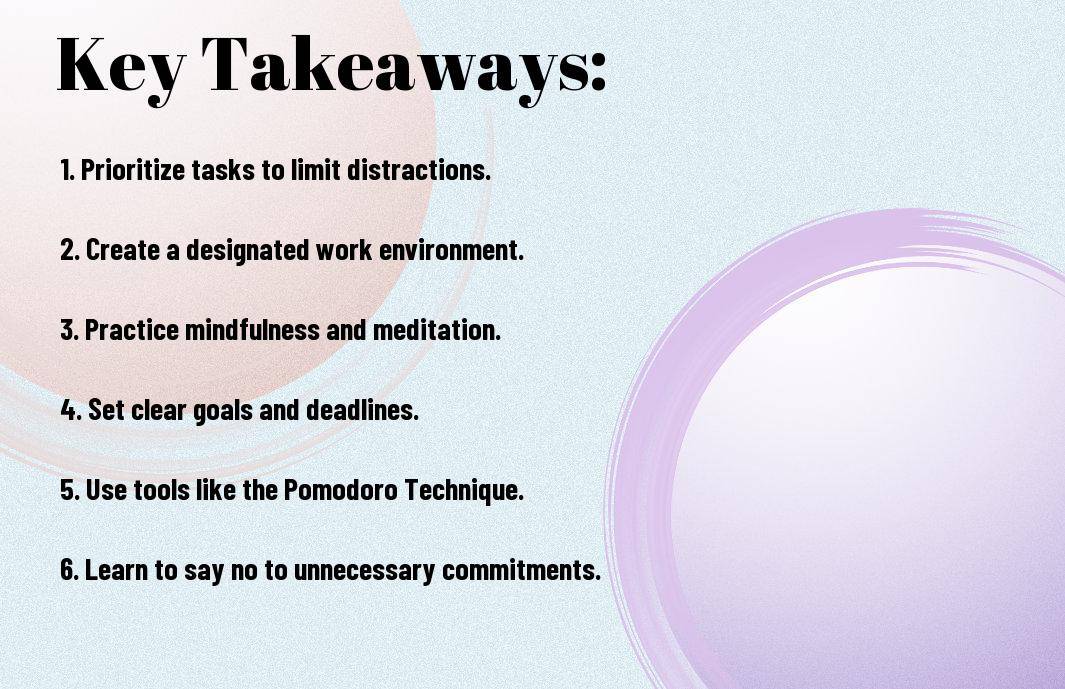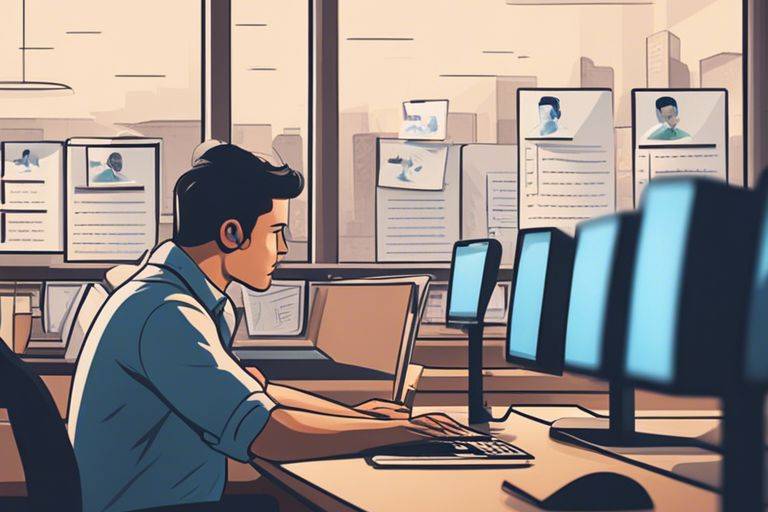Beating Distractions with the The Art of Focus! You know how easy it is to get sidetracked in today’s fast-paced world. Whether it’s social media notifications, chatty coworkers, or our own wandering thoughts, distractions can hinder our productivity and prevent us from reaching our goals. In this blog post, we will explore effective strategies for beating distractions inspired by the The Art of Focus.
Key Takeaways:
- Acknowledge distractions: Recognize your distractions and be aware of what commonly pulls you away from your focus.
- Set clear goals: Define your objectives and tasks clearly to maintain a sense of purpose and direction.
- Establish a routine: Create a structured schedule that includes designated time for focused work and breaks.
- Practice mindfulness: Stay present and fully engage in your tasks to reduce the impact of distractions.
- Use technology mindfully: Leverage technology as a tool for productivity, but also set boundaries to prevent it from becoming a distraction.
- Prioritize tasks: Focus on completing high-priority tasks first to ensure important work is done before addressing less critical matters.
- Learn to say no: Set boundaries and politely decline distractions or tasks that do not align with your goals and priorities.

The Science of Attention
Clearly, focusing our attention is vital for completing tasks, learning new information, and achieving our goals. Understanding how our brain processes attention can help us improve our ability to concentrate and ignore distractions.
How Focus Works in the Brain
Attention is controlled by a network of brain regions, including the prefrontal cortex, parietal cortex, and thalamus. These regions work together to select relevant information and filter out irrelevant stimuli. When we focus on a task, our brain enhances the activity in areas related to that task, while suppressing activity in areas responsible for distractions. By strengthening neural connections through practice and mindfulness techniques, we can train our brain to improve focus and concentration.
Myths and Misconceptions About Concentration
Science has debunked many myths about concentration, such as the idea that multitasking is efficient or that willpower is the only factor in staying focused. In reality, multitasking can reduce productivity by up to 40% and willpower is a limited resource that can be depleted. By understanding the science of attention, we can adopt strategies that are more effective in overcoming distractions and sustaining focus.
This knowledge can empower us to make conscious choices about how we allocate our attention and optimize our cognitive resources. By dispelling myths and embracing proven techniques, we can enhance our ability to concentrate and accomplish tasks with greater efficiency and effectiveness.

Identifying Your Distractions
Now is the time to take a closer look at the distractions that often pull your focus away from important tasks. By identifying these distractions, you can take steps to minimize their impact and stay on track with your goals.
Common External Distractions to Watch Out For
The first step in overcoming distractions is to be aware of the common external factors that can derail your focus. These distractions may include noisy environments, interruptions from coworkers or family members, or constant notifications from your phone or computer. By recognizing these triggers, you can create strategies to minimize their influence on your concentration, such as setting aside dedicated work time in a quiet space or silencing unnecessary notifications.
The Sneaky Internal Distractions You Might Not Notice
Distractions are not always external – sometimes they come from within. Internal distractions like negative self-talk, feelings of self-doubt, or perfectionism can be just as detrimental to your focus as external factors. It’s important to recognize when these internal distractions creep in and take steps to address them. By practicing self-awareness and self-compassion, you can combat these sneaky distractions and create a more supportive mindset for staying focused.
Understanding the different types of distractions, both external and internal, is crucial in developing effective strategies for maintaining focus. By acknowledging the impact these distractions have on your productivity and implementing proactive measures to address them, you can cultivate a more focused and productive work environment.
Creating an Environment for Success
Many of us struggle to stay focused in a world full of distractions. One way to combat this is by creating an environment that is conducive to productivity and focus. By organizing your physical space for optimal focusing, you can set yourself up for success in your tasks and goals.
Organizing Your Physical Space for Optimal Focusing
Focusing on decluttering your workspace can have a significant impact on your ability to concentrate. Ensure that your desk is tidy and only contains the imperatives you need for the task at hand. A clean and organized environment can help reduce mental clutter and make it easier to focus on the task in front of you. Consider adding personal touches like plants or inspiring quotes to boost your mood and motivation.
Digital Harmony: Managing Technology to Aid Concentration
To further enhance your focus, it’s crucial to manage your digital devices effectively. Managing your notifications, setting specific times for checking emails and social media, and utilizing tools like website blockers can help reduce distractions from technology. Creating designated tech-free zones or times in your day can also promote a more focused and productive work environment.
Mindfulness and Focus
All too often, our minds can wander and pull us away from the task at hand. Practicing mindfulness is a powerful way to regain control over our attention and enhance our focus. By being fully present in the moment and cultivating awareness of our thoughts and feelings, we can train our minds to stay on track and avoid distractions.
Harnessing Mindfulness Practices to Enhance Concentration
Mindfulness practices such as meditation can be incredibly effective in improving concentration. By setting aside dedicated time each day to focus on your breathing or simply observe your thoughts without judgment, you can strengthen your ability to maintain focus during other activities. Incorporating mindfulness into your daily routine can help you become more aware of how distractions arise and empower you to redirect your attention back to the task at hand.
Breathing Techniques That Can Help Clear Your Mind
An important aspect of incorporating mindfulness into your focus practice is using breathing techniques to clear your mind. By taking deep, intentional breaths and focusing on the sensation of air entering and leaving your body, you can create a sense of calm and clarity. This simple yet powerful practice can help you center yourself and let go of any racing thoughts or anxieties that may be hindering your ability to concentrate.
The Role of Habits and Routines
Keep habits and routines in mind when striving for improved focus and productivity. Building habits for sustained focus is crucial for long-term success. By incorporating small daily practices into your routine, you can train your brain to stay focused for longer periods of time.
Building Habits for Sustained Focus
Habits play a crucial role in achieving sustained focus. Start by setting aside specific times each day dedicated solely to focused work. This practice can help condition your mind to enter a state of deep focus during these designated periods, enhancing your overall productivity. Consistency is key in building these habits, as repeating the same routine daily reinforces your brain’s ability to concentrate and ignore distractions.
The Importance of Breaks and Downtime
For optimal focus, it’s crucial to recognize the significance of breaks and downtime in your daily routine. While it may seem counterintuitive, taking regular breaks can actually boost productivity. Short breaks allow your brain to rest and recharge, maintaining high levels of focus throughout the day. Additionally, incorporating moments of downtime into your schedule gives your mind a chance to relax and rejuvenate, leading to improved overall focus and creativity.
The balance between focused work and breaks is crucial in maintaining a healthy and sustainable level of concentration. Remember to listen to your body and mind, and incorporate breaks and downtime into your routine to maximize your productivity and focus.
Tools and Apps to Help You Focus
Unlike ever before, we live in a world filled with distractions that can hinder our focus and productivity. Fortunately, there are various tools and applications available to help us combat these distractions and stay on track with our tasks.
Time Management Applications That Can Boost Your Focus
Your time is precious, and managing it effectively can greatly improve your focus. Time management applications like Trello, Todoist, or Toggl can help you organize and prioritize your tasks. These apps offer features such as task lists, reminders, and time tracking to keep you focused and on schedule. By breaking down your work into manageable chunks and setting deadlines, you can increase your productivity and stay focused on what truly matters.
Other Useful Gadgets and Resources
With the rise of technology, there are many gadgets and resources available to support your focus and concentration. Tools like noise-canceling headphones, standing desks, or ergonomic chairs can create a conducive work environment. Additionally, resources such as white noise apps, focus-boosting playlists, or meditation apps can help you eliminate distractions and enhance your concentration.
Understanding the importance of minimizing distractions is key to improving your focus and achieving your goals. By utilizing time management applications and incorporating useful gadgets and resources into your daily routine, you can create a more productive and focused work environment. Stay proactive in finding what works best for you and implement these tools to beat distractions and boost your focus.
Staying Motivated and Overcoming Setbacks
For many individuals aiming to improve their focus, maintaining motivation over the long run can be a challenging task. However, there are certain strategies that can be implemented to help you stay on track and accomplish your goals.
Strategies for Long-Term Motivation
Motivation is like a flame that needs to be constantly fueled. To sustain your drive, set clear and achievable goals, break them down into smaller tasks, and celebrate each milestone along the way. Surround yourself with a supportive network of friends or colleagues who can offer encouragement during tough times. Regularly remind yourself why you started this journey in the first place, and visualize the benefits of staying focused on your end goal.
How to Bounce Back When You Lose Focus
Motivation plays a crucial role in helping you bounce back when distractions derail your progress. When faced with setbacks, take a moment to assess what went wrong without being too hard on yourself. Identify the triggers that led to your loss of focus and create a plan to avoid them in the future. Find inspiration from success stories of others who have overcome similar obstacles, and use their experiences as a source of encouragement to get back on track.
Understanding that setbacks are a natural part of any journey towards improvement will help you navigate through rough patches with resilience and determination. Stay positive and keep moving forward, remembering that each setback is an opportunity to learn and grow stronger in your pursuit of mastering the art of focus.
Summing up
So, if you’re looking to boost your focus and productivity, be sure to check out the Lessons from The Art of Focus | The Yarno Blog. By implementing some of the tips discussed in this article, such as setting clear goals, creating a distraction-free environment, and practicing mindfulness, you’ll be well on your way to mastering the art of focus. Note, it’s all about finding what works best for you and making small changes to help you beat distractions and stay on track!
FAQ
Q: Why is focus important?
A: Focus is important because it helps us complete tasks efficiently, make better decisions, and achieve our goals effectively.
Q: What is distraction?
A: Distraction is anything that diverts our attention away from the task at hand, making it difficult to concentrate and be productive.
Q: How can distractions affect productivity?
A: Distractions can lead to decreased productivity, increased errors, and delays in completing tasks, ultimately hindering our overall performance.
Q: What are some common sources of distractions?
A: Common sources of distractions include social media, emails, notifications, multitasking, noise, and interruptions from others.
Q: How can I beat distractions and improve my focus?
A: To beat distractions and improve focus, you can try strategies such as setting clear goals, creating a distraction-free environment, prioritizing tasks, practicing mindfulness, and taking regular breaks.
Q: How can “The Art of Focus” help me overcome distractions?
A: “The Art of Focus” provides valuable insights and practical tips on how to sharpen your focus, avoid distractions, and maximize your productivity in various aspects of life.
Q: What are some benefits of mastering the art of focus?
A: By mastering the art of focus, you can enhance your performance, boost creativity, reduce stress, increase efficiency, and achieve a greater sense of fulfillment in both your personal and professional endeavors.
Expand your reading
Pomodoro Technique – Francesco Cirillo’s Method to Improve Focus and Manage Time
The Science of Concentration in The Art of Focus



